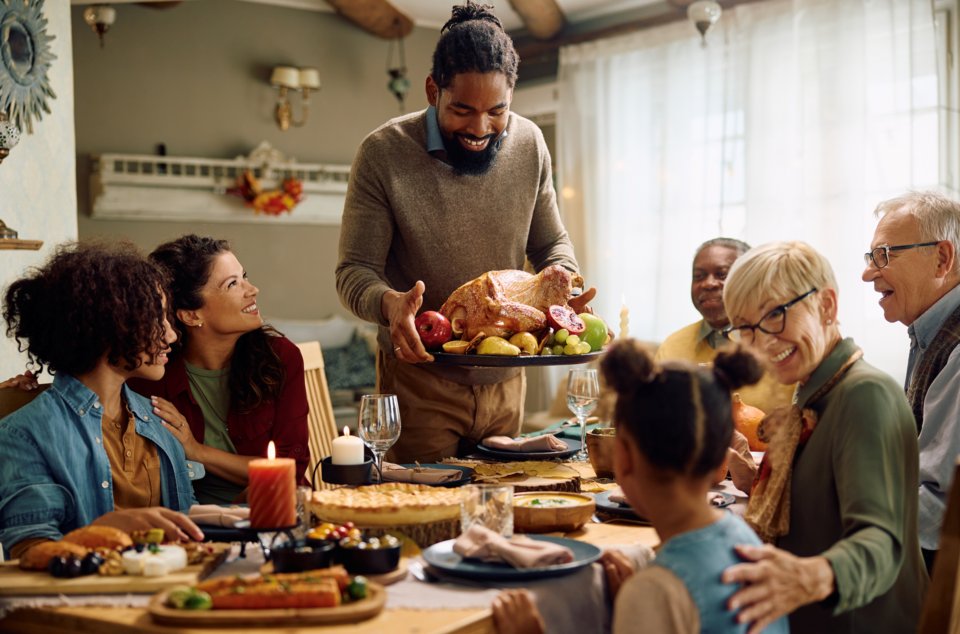By Dr. Michael Green, MD, FAAFP, FCUCM, Associate Medical Director, Northwell Health-GoHealth Urgent Care
Thanksgiving is quickly approaching as families across New York prepare to come together and give thanks. Picture this: family and friends gathering from around the world. A gathering so large that you need four turkeys. That’s how I spend my Thanksgiving every year.
While Thanksgiving is a time for celebration and togetherness, it also comes with potential hazards. Togetherness not only raises the risks of the COVID-cold-flu season. But injuries from house fires, food-borne illnesses and food prep cuts and burns also increase during the holiday season.
As the associate medical director at Northwell Health-GoHealth Urgent Care, I see a wide range of injuries from cuts and burns to twisted ankles. Here are some important safety reminders that can help ensure your Thanksgiving is full of happy memories:
1. Treating a cooking burn: Cooking-related house fires reach an all-time high on Thanksgiving Day. The risk of a fire seems dangerous enough, but the holiday also offers plenty of opportunities to burn yourself. So how do you assess and treat a burn?
First, run the burned area under lukewarm or cool water (not icy cold, as this can cause more damage) for 10 to 15 minutes and then check the burn for size and color. Most cooking-related burns can be treated with soothing creams like aloe and over-the-counter pain medications. But immediate medical care should be sought for burns larger than 1-2 inches, those in a really sensitive area, or charred skin that’s white, brown, leathery or shiny.
2. Don’t rinse a raw turkey: Many people think rinsing a turkey before they cook it will wash away harmful bacteria that poultry can contain. However, this practice causes bacteria-containing droplets to splash across the sink, cooking surfaces, utensils, and nearby food, contaminating the entire kitchen. Instead, pat your turkey with a paper towel before cooking, and then wash your hands with soap and water.
3. Quickly put away your leftovers: Bacteria like salmonella and Clostridium perfingens – the so-called “buffet germ” that grows at room temperature – will give you tummy trouble. Cook your turkey and stuffing to at least 165⁰ F and keep food at 140⁰ or warmer or 40⁰ or cooler if it’s not being eaten right away. Consider making your stuffing outside the bird for an even safer option. If you suspect food poisoning, drink lots of fluids, including electrolytes.
4. Know your knife safety protocols: More than 1/3 of knife-related injuries happen in the kitchen. Protect your fingers by using sharp knives, as dull blades require more pressure to cut. Curl your fingers and cut away from your body when trimming or deboning. Keep your knives off counters and out of sinks by washing and storing them immediately.
As a child, my brother cut himself while preparing for Thanksgiving and my parents spent hours in the ER waiting to be seen for sutures. Today, these types of injuries are better seen at Northwell-GoHealth Urgent Care, so you can quickly return to your holiday celebrations.
5. Sick-season protocols: Health professionals expect an uptick in cases of COVID-19, influenza, and the common cold this holiday season. Consider putting protocols in place like checking COVID and flu vaccine statuses. You can also request guests to take rapid COVID-19 tests in advance of attendance. If your group has any high-risk individuals, you can consider even more rigorous testing protocols like PCR tests available at Northwell Health-GoHealth Urgent Care centers. Ask guests to screen themselves for any cold, flu or COVID symptoms and stay even if symptoms are mild.
Remind your guests to practice safe hygiene by washing their hands regularly. The rule always bears repeating: wash your hands with soap and water for at least 20 seconds before and after touching your eyes, nose or mouth, prepping food, eating a meal, and using the restroom.
6. Prep before you play: An afternoon of backyard football is a common Thanksgiving tradition. As a result, health professionals see an uptick in pulled muscles, sprained ankles, and broken bones. The best defenses are to exercise regularly throughout the year, avoid alcohol before the game, and stretch and warm up your body before engaging in intense play. Strains and sprains are the types of injuries better seen at Northwell-GoHealth than at your ER.
This Thanksgiving let's not only celebrate what we’re thankful for but also take steps to protect our health and the health of those we love. By following these tips, we can ensure a safe and joyful holiday season for all.
Wishing you and your loved ones a happy, healthy, and thankful Thanksgiving!




